Arctic Ice March 2011
Posted on 30 March 2011 by logicman
This is a repost of my Science 2.0 article Arctic_Ice_March_2011_Update_#2, with an introduction, updates and minor edits.
Introduction
The main mass of Arctic sea ice has previously consisted mostly of thick multi-year ice. In the winter of 2006 - 2007 there was a crossover: first year ice became the majority component.
The Arctic sea ice cap is getting younger. A population of older ice is being replaced as the older ice is lost and new ice does not linger long enough to get old. The former dominance of thick multi-year ice together with a gyratory motion caused new ice to enter the main pack and be trapped there for many years. The Transpolar Drift and Beaufort Gyre formerly brought new ice into the main pack and exported old ice - mainly on the Atlantic side through Fram Strait. The export and import were formerly in broad balance. They are not balanced now.
Younger and thinner ice now allows a more rapid transit of floes through the pack. The age of the oldest ice is the length of time during which it was prevented from advecting south by being trapped in the main pack.
It appears that as the ice gets thinner and more mobile, that very mobility is a positive feedback to ice loss.
Arctic Ice March 2011
The melt season of 2010 ended with a low extent and with little ice older than two years. There are strong indications that the winter of 2010 - 2011 did not compact and thicken the sea ice as much as would normally be expected.
Arctic sea ice extent averaged over December 2010 was 12.00 million square kilometers (4.63 million square miles). This is the lowest December ice extent recorded in satellite observations from 1979 to 2010, 270,000 square kilometers (104,000 square miles) below the previous record low of 12.27 million square kilometers (4.74 million square miles) set in 2006 and 1.35 million square kilometers (521,000 square miles) below the 1979 to 2000 average.
... unfrozen areas of the ocean continued to release heat to the atmosphere, and an unusual circulation pattern brought warm air into the Arctic from the south. Although the air temperatures were still below freezing on average, the additional ocean and atmospheric heat slowed ice growth.
http://nsidc.org/arcticseaicenews/2011/010511.html
It appears to me that the 2011 melt season began with weaker, thinner, less consolidated ice than at any time in recorded history. Where the slabbing and compaction has been least, the newest ice between the older floes is likely to melt soon.
I suggest that by mid-April the sea ice will be in a similar condition to that of late August 2010. In plain terms, the 2011 melt season will soon continue more or less where the 2010 melt season left off.
To illustrate that last point, this animation compares 25 March 2011 ice extent on Greenland's northeast coast with 25 March, 10 April, and 01 June 2010.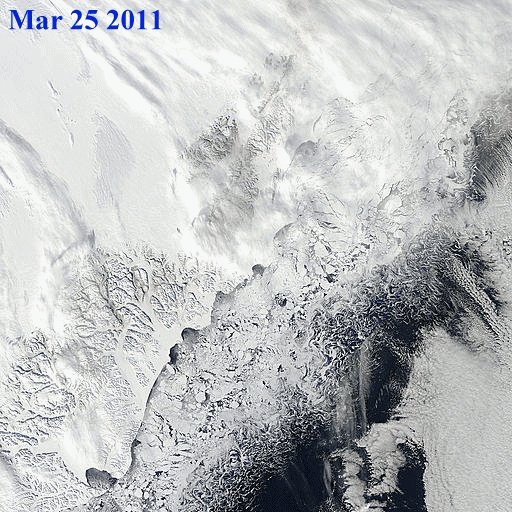
Ice extent comparisons - from MODIS Arctic mosaic images.
Melting and re-freezing
Many areas of the Arctic are melting, advecting and re-freezing. This superimposes local variation noise on signals of ice extent. I call this 'the Arctic ice jitters'.
Sea ice extent in February and March tends to be quite variable, because ice near the edge is thin and often quite dispersed. The thin ice is highly sensitive to weather, moving or melting quickly in response to changing winds and temperatures, and it often oscillates near the maximum extent for several days or weeks, as it has done this year.
Source: NSIDC report March 23, 2011
The following images show the ice jitter effect in an Arctic mosaic segment which includes Kara Strait.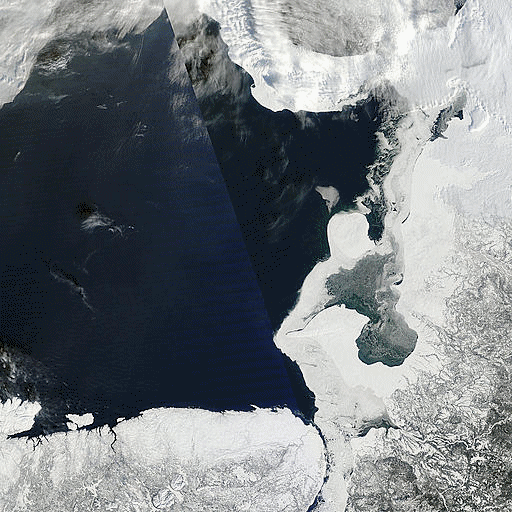
Kara Strait - ice extent jitters
Note that this sea ice will appear in extent numbers but will have no impact whatsoever on the mass of ice in the main polar sea-ice cap.
The tale of the tape
The unusual behaviour of Arctic ice this year is shown at a glance by the Cryosphere Today's 'tale of the tape': the 2011 portion of the graph could not have been predicted from previous data. The 2011 plot of anomalies is itself anomalous.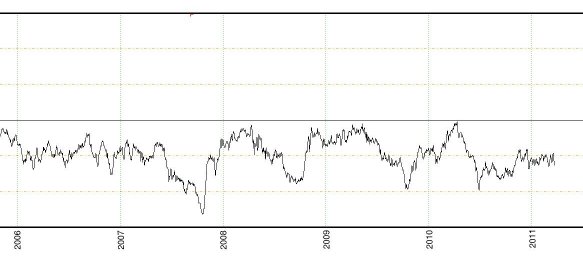
The graph as a whole shows a clear negative anomaly trend since 1979.![]()
The latest update of the full sized 'tale of the tape' can be seen at http://arctic.atmos.uiuc.edu/cryosphere/
The animation below of the sea ice concentration chart from Cryosphere Today shows changes in ice distribution from 31 December 2010 to 22 March 2011 in 5 day steps.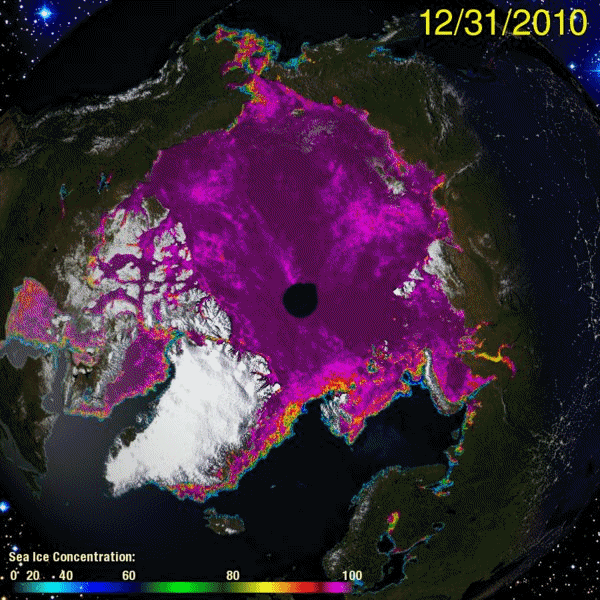
Sea ice concentration Dec 31 2010 to Mar 22 2011
The chart of sea ice concentration should be read in conjunction with the PIPS ice displacement chart animation and the current ice thickness chart below.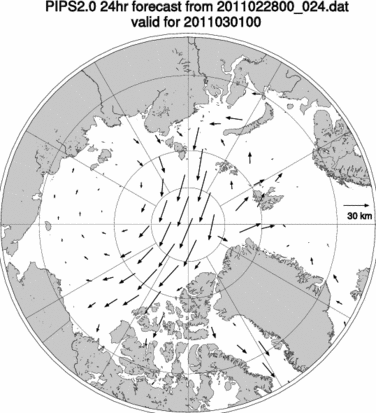
Ice displacement charts from March 01 to March 25 2011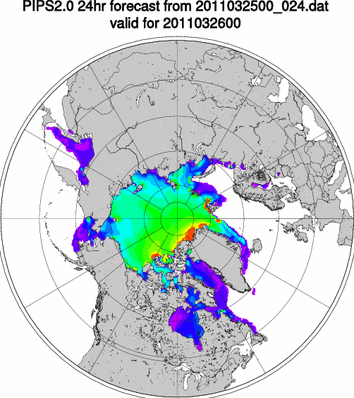
PIPS ice thickness forecast.
The red, yellow and green areas in the ice thickness chart are the last vestiges of sea ice thicker than 2.75 meters in the entire Arctic. They consist of heavily fragmented ice much of which is being advected through the Fram Strait. When the Nares Strait and NWP ice breaks up, that thick ice will be highly susceptible to advection through those passages.
The 3 to 5 thousand years old ice shelves which once extended north of Ellesmere island are now down to the last fragments. If we discount those fragments there is little ice in the entire Arctic older than 5 years. It bears constant repeating that the bulk of Arctic ice 2011 is 2 years old or less.
Nares Strait
Recent ice advection patterns; warm water advances into the Arctic from the Atlantic; ice distribution patterns: all of these things show that conditions continue to be advantageous for export of ice through Fram Strait. Nares Strait is currently blocked by relatively weak ice. As soon as the ice in Nares Strait breaks up, a continuation of current trends will be advantageous for the export of substantial volumes of the remaining older ice through that channel, supplementing the export through Fram Strait.
We are now (27 March 2011) within the time frame of my March 02, 2011 predition for the breakup of the Nares Strait ice bridge. Radar images show a melange of last year's floes and young ice. This melange is so weak that a few cloudless days and / or a strong wind towards Baffin Bay will cause a rapid breakup of the ice bridge. I expect to see ice being advected through Nares Strait about the 14th of April.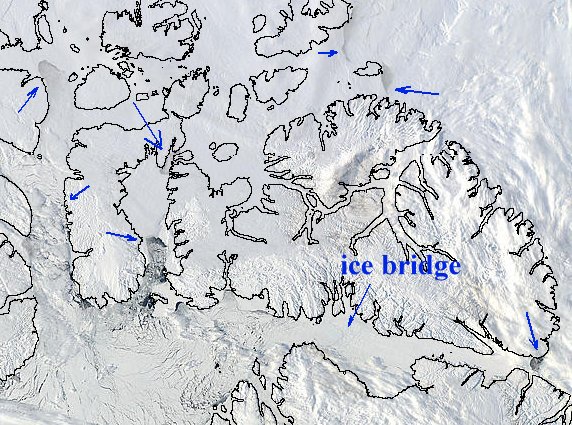
NWP and Nares Strait
The arrows show 'places of interest' where ice is breaking up and being replaced by open water. The ice bridge is still intact, but its breakup is imminent.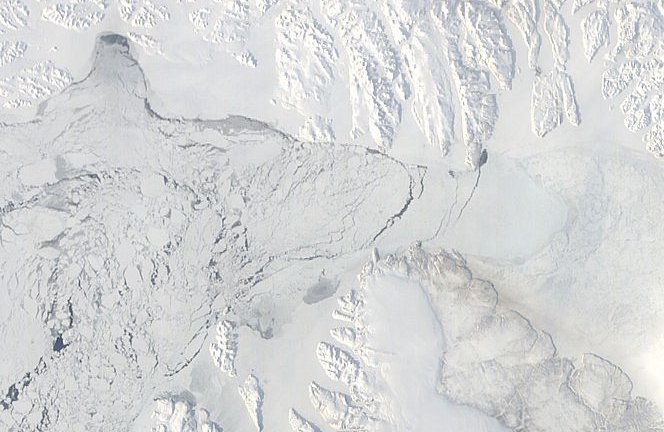
Ice bridge at Kane Basin, Nares Strait March 26 2011
Ice volume
The decline in ice volume since 1979 is dramatically illustrated by this PIOMAS graph.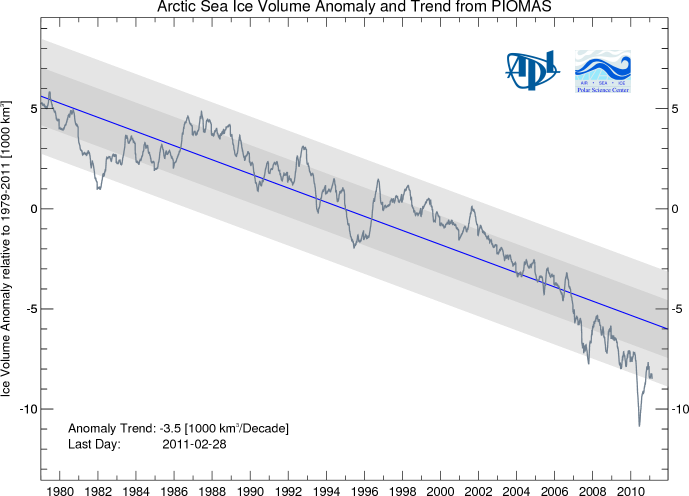
The importance of ice volume is that it reflects the ability of the Arctic sea ice cap to absorb heat without melting away entirely. Thicker ice can survive summer melting longer than thinner ice. Thicker ice has greater momentum by which massive floes slide over and under each other, slide over ice rubble, create massive compression ridges and generally make the ice more robust. Thinner ice can melt away entirely, can fragment instead of slabbing.
An ice cap which is rejecting heat all winter can absorb the same amount of heat during summer without raising its temperature to the melting point. Ice lost by ablation is readily replaced by the freezing of rain, snow and meltwater. A robust ice cap, due to its thermal capacity, cannot melt away in summer.
The ice cap we see today is not robust.
Ice displacement patterns such as the one below will drive a great volume of ice out of the Arctic Ocean and into warmer waters.
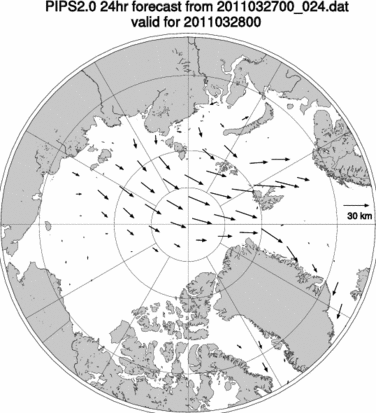
Summary
The melt season of 2011 is under way with less volume than former melt seasons.
Of that lesser volume, about 90% appears to be under 2.75 meters thick.
Much of the ice is less than 1 year old.
The Arctic's dynamic system seems primed to advect large quantities of ice out of the main ice cap area.
The Beaufort Gyre and Transpolar Drift have not yet appeared as stable patterns. The instabilities in the ice drift patterns broadly favor ice export via Fram Strait.
Collapse of the Nares ice bridge is imminent.
Forecast
These forecasts represent what I expect to see based on a continuation of general trends.
Dates given should be taken as plus or minus 3 days.
The Nares ice bridge will be fragmented, and the ice in Kane Basin will be melting out by April 7th.
Ice from Lincoln Sea will be advecting through Nares Strait by April 14th.
The main North West Passage ice will show strong evidence of breakup and melt by April 30th.
By April 30th, ice extent graphs will show a strong downward trend similar to that of May - June 2010.
-------------------------------------------------
Sources:
http://nsidc.org/arcticseaicenews/2011/010511.html
Polar Science Center
http://arctic.atmos.uiuc.edu/cryosphere/
http://rapidfire.sci.gsfc.nasa.gov
http://www7320.nrlssc.navy.mil/pips2/
Further resources:
Arctic Sea Ice Blog
arctic sea ice graphs
Related articles:
Arctic Ice 2011 - Sail, Steam And Satellites
Arctic Ice March 2011
Arctic Ice March 2011 - Update #1
ice-in-baffin-bay
The ChatterBox Arctic Index































 Arguments
Arguments






























- Everything is either random or cyclical
- We can't know anything
- You are a scientist
Science's position (Global Warming):Secondly, the historical data do not necessarily say that the ice is insensitive to the change in temperature as temperature is not the only thing that controls ice loss, and those factors need to be considered. It is also possible that the earlier warming did cause reductions in sea ice volume, but not extent.
Now it is time to "put up or shut up", what evidence do you have that multi-decadal oscillations exist in sea ice extent or suggested causal meachanism. If you can't come up with something, then you objection is no more reasonable than "melting is caused by the orbit of Pluto", or "it is being stolen by little green men from uranus", or astrology.
It is interesting Gilles mentions astrology as it was used to exemplify the difference between science and non-science by Popper. Gilles could usefully occupy his time reading up on Poppers work (e.g. here). He might even realise that what he is doing is rather akin to astrology (looking for correlations that "explain" the observations without worrying about a physical mechanism that might imply the correlation is due to a causal relationship. If you look hard enough you can always find a correllation with something - even if it is the motion of Pluto - not that anyone would make that argument ;o).